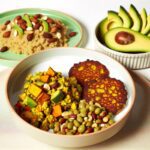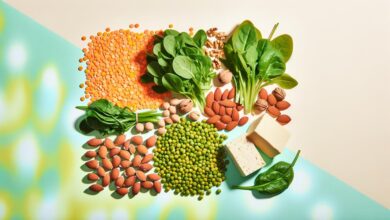You've likely heard that as you age, your dietary needs evolve, particularly your protein intake, but have you considered the potential of plant-based sources to meet these requirements? In a society increasingly aware of the ethical implications of animal consumption, and the cultural shift towards more sustainable eating practices, it's worth exploring how you can maintain a nutritious diet that supports your health and aligns with your values. Legumes, whole grains, nuts, and seeds offer not just protein, but a symphony of essential nutrients tailored for an aging body, without relying on animal products. As you contemplate your next meal, consider how soy products, often touted for their versatility and health benefits, might fit into a senior-friendly, plant-based diet. The question remains, can these alternatives provide not just adequate nutrition, but enhance your well-being and longevity? Let's unpack the evidence and discover how your golden years can be both ethically sound and robustly nourished.
Key Takeaways
- Protein is crucial for maintaining muscle strength in aging individuals.
- Plant-based proteins, such as legumes, nuts, and seeds, are compassionate choices that support muscle preservation and are gentler on aging digestive systems.
- Incorporating whole grains into meals provides sustained energy and offers a variety of flavors and textures.
- Soy products, like tofu, are nutrient-rich options that support heart health, bone strength, and animal welfare.
Understanding Protein Needs in Aging
Why should you pay attention to your protein intake as you age, especially when prioritizing ethical and plant-based sources? Well, as time marches on, maintaining strength isn't just about staying active; it's also about what you nourish your body with. Muscle preservation becomes a vital concern, and protein is the cornerstone of keeping those muscles robust. But here's the catch: aging can bring about appetite challenges, making it harder to get enough protein through your diet.
Embracing plant-based proteins isn't just kind to your body; it's a compassionate choice that serves the greater good. By choosing legumes, whole grains, nuts, and seeds, you're opting for sustainable sources that don't burden our planet the same way animal-based proteins do. Moreover, these ethical options can be gentler on aging digestive systems, while still fulfilling your nutritional needs.
You're in a position to set an example for future generations, showing that it's possible to live a life of vitality without compromising the welfare of other beings. It's about finding balance – getting the protein your body craves, while upholding values that celebrate life in all its forms. Choose to serve yourself and the world wisely.
Legumes: A Powerhouse of Nutrition
Legumes, nature's tiny but mighty nutrition capsules, offer you a wealth of protein and essential nutrients without compromising ethical values. As you explore plant-based diets, you're not just embracing a personal health transformation; you're also participating in a cultural shift towards more sustainable and compassionate eating habits.
The legume family is vast, with a variety that spans from lentils and chickpeas to black beans and peas. This legume diversity ensures you can always find something to suit your palate while contributing to a balanced diet. Packed with fiber, these wholesome foods support your digestive health and help maintain stable blood sugar levels, a boon for your golden years.
Mastering a few cooking techniques can unlock legumes' full potential. Soaking beans overnight reduces cooking time and improves their digestibility. Experiment with spices and herbs to enhance their natural flavors, turning a simple bean stew into a culinary masterpiece.
Whole Grains for Sustained Energy
Moving beyond legumes, whole grains stand as another cornerstone of plant-based nutrition, offering lasting energy to support your active lifestyle. Embracing a grain variety ensures not only a spectrum of flavors and textures but also a tapestry of cultural wisdom that honors the earth's bounty. You're not just choosing sustenance; you're participating in a tradition of ethical eating that sustains both the body and the planet.
Here's a snapshot of how different whole grains can enrich your diet:
| Grain | Emotional Benefit |
|---|---|
| Quinoa | Connects you to ancient Andean civilizations, symbolizing resilience and versatility. |
| Brown Rice | Offers a comforting staple that grounds you in the simplicity and warmth of home. |
| Oatmeal | Invites a moment of reflection and nourishment to start your day with intention. |
Incorporating these grains into your meals isn't just about the act of eating; it's a form of service to yourself and others. You're ensuring that your table is a place of welcoming and wellness. Whether you're exploring cooking methods like steaming quinoa, simmering brown rice, or baking with oatmeal, you're crafting dishes that sustain energy and embody care. Your choices ripple outward, promoting a kinder, more compassionate world.
Nuts and Seeds: Essential Amino Acids
Diversifying your diet with a handful of nuts and seeds provides you with essential amino acids, the building blocks of protein that support your body's vitality and well-being. These tiny powerhouses are steeped in cultural traditions, revered for their nourishment, and cherished for their role in a compassionate, plant-based lifestyle. They're not just good for you, they're a conscious choice for the planet and for the creatures with whom we share it.
When considering nuts and seeds, it's important to be mindful of nut allergies, which can pose serious health risks. Opting for seeds can be a safe and equally nutritious alternative. Seeds like chia, hemp, and flax are packed with protein and can be easily integrated into your daily meals.
Moreover, seed sprouting is a simple process that unlocks even more nutrients, making them more digestible and enhancing their amino acid profile. It's a practice that pays homage to the wisdom of our ancestors, harnessing the full potential of seeds in a way that's both kind and nourishing.
Soy Products and Their Benefits
While exploring plant-based proteins, don't overlook the versatile soybean, a staple in many cultures that offers a wealth of nutrients and ethical benefits. Soy versatility shines through in its myriad forms, each catering to different culinary needs and health requirements, especially for seniors who may seek compassionate, nutritious food choices.
Consider tofu, a soy product celebrated for its ability to absorb flavors and transform into countless dishes. The beauty of tofu recipes lies in their adaptability; whether you're craving a stir-fry, a comforting soup, or a smoothie, tofu seamlessly integrates, providing a high-quality protein source without the ethical quandaries of animal-based foods.
Moreover, soy products are often rich in essential amino acids, fiber, and isoflavones, which contribute to heart health and bone strength – key concerns for the aging population. By choosing soy, you're not only serving your body with respect but also honoring the environment and animal welfare.
Embracing soy means participating in a tradition of sustainable, compassionate eating. It's a conscious choice that nurtures both personal health and the broader world, reflecting a deep-seated respect for life and longevity. So, as you nourish yourself or serve others, let soy be a cornerstone of your ethical, plant-based journey.
Frequently Asked Questions
How Can Seniors With Difficulty Chewing or Swallowing Incorporate High-Protein, Animal-Free Foods Into Their Diet?
You can blend nuts, seeds, or cooked legumes into smoothies, offering high-protein options that don't require much chewing and serve as effective swallowing aids for those committed to compassionate, plant-based living.
Can a Senior's Protein Requirements Be Met Entirely Through Animal-Free Sources Without the Use of Supplements?
Yes, you can meet your protein needs with plant-based foods, considering protein absorption rates and allergen considerations, supporting ethical eating while serving nutritional requirements with compassion and care.
Are There Any Risks of Nutrient Deficiencies When Seniors Switch to a Completely Animal-Free Protein Diet?
You might face nutrient absorption hurdles and allergy considerations when embracing a purely plant-based diet, ensuring compassionate choices while serving your body's needs requires careful planning and a watchful eye on your health.
How Do the Costs of Animal-Free Protein Sources Compare to Traditional Animal-Based Proteins for Seniors on a Fixed Income?
You'll find that cost comparison analysis often shows plant-based proteins are more budget-friendly, especially considering fixed income challenges, reflecting a compassionate choice that aligns with serving others and ethical, cultural insights.
What Are Some Simple, Senior-Friendly Recipes That Incorporate a Variety of Animal-Free Protein Sources for a Balanced Diet?
You'll love serving protein-packed smoothies and quinoa stuffed peppers—nutritious dishes that respect cultural insights and ethical eating, perfectly aligning with your plant-based dedication to nourishment and care for others.







